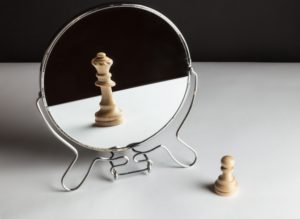
September 10, 2017
“Your task is not to seek for love, but merely seek and find all the barriers within yourself that you have built against it.”
—Rumi
A healthy self-image is important. At the same time, it can reflect another face of ‘attachment’, the word we tackled in the last Seedlings. Your self-image is about who you think you are, or wish you were, or think you should be. But if you hold too tightly to your self-image, if you’re too attached, it may get in the way of having the relationships you want.
Relationships thrive when we’re able to be vulnerable. Vulnerability can’t survive when we’re holding tightly to who we think we are. It’s like we barricade ourselves inside invisible but impenetrable walls. When we’re holding tightly to who we think we are, we’re blinded from seeing anything outside the narrow lens through which we’re looking.
If your self-image only acknowledges your best self, but ignores that you also have limitations that can be painful to acknowledge, much less accept, you might be missing out on some of the best that your relationships have to offer and teach you.
Because relationships are a mirror, AND a great way to get an honest look at who you really are, not just who you think you are (your self-image). If you let them, they will bring you to your best self organically, rather than leaving you with no choice but to pretend to yourself that you’ve already arrived. Pretending is quicker, but working with reality will give you longer term benefits.
When we can drop the defenses — the walls we put up to protect ourselves from uncomfortable feelings — the rewards can be impressive. When my son’s dad and I divorced many years ago, we had demonized each other and were both holding on tightly to our images of ourselves as the wounded partner. When we were able to drop the walls and stand in the rawness of vulnerability, we became dear friends and parented our son together.
When we’re vulnerable we’re open to feedback. If your kids are telling you that you’re a control freak but you believe that you’re simply a parent who needs to maintain discipline through close monitoring, you may be missing something. If your partner says you can be rigid but you believe that you’re the most flexible person in the world, you might be missing something. Or if your friends tell you that you’re stubborn but you simply believe you’re a person of strong convictions, you may be missing something.
A dear friend once gave me feedback that although my quick mind and reactivity were characteristics she admired, at the same time, they made her hesitate to share when all she wanted was a listening, objective and loving ear. That feedback made me aware that the communication I had always believed was my greatest strength, was also potentially my greatest weakness. I am beyond grateful for her honesty, and I’m still working on it.
Consider that every piece of feedback you’ve ever received from anyone may be of value. Especially the feedback that stings. Sometimes I’m not ready to accept it. But when I am able to work up the courage to hold my self-image a little more lightly and take myself a little less seriously, I am probably resting in the truth of who I am, not who I wish I was or think I should be. And there’s something very grounding about that.
Much love,

Isn’t it interesting how blind we can be to ourselves. Yet we seem to think we can see others so clearly. I think this particular post is chock full of really valuable wisdom and food for thought.
Thanks Ryan. One of the hardest learnings for me is to keep the lens pointed back at me!
Well written, nice!!!
Thanks kiddo!
Along these lines, I have signed up for the Self-Acceptance Summit at SoundsTrue.com. Starts September 11, tomorrow. Not searching for magic bullets, just more tools.
I think maybe tools are like friends — you can’t have too many!!